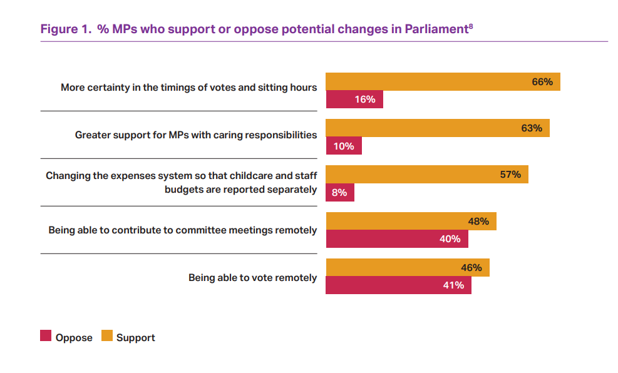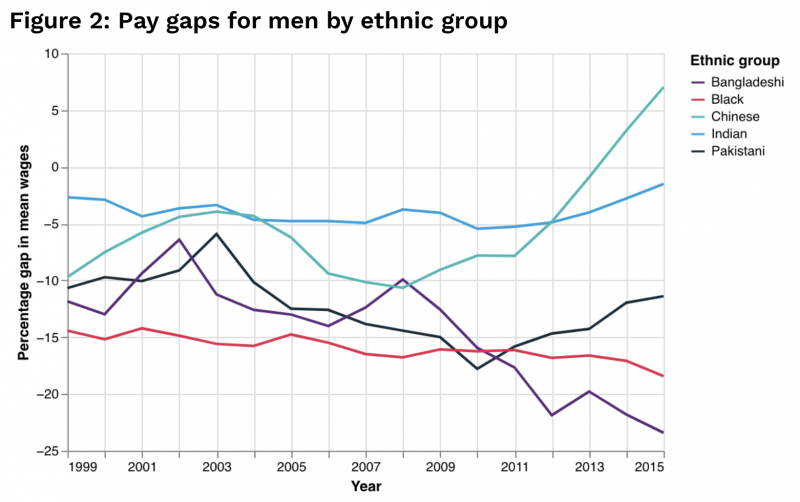Recent research shows that Westminster has an exclusionary culture and this risks the retention of women MPs. Alex Shepherd and Lizzie Ville set out some of the key reforms needed for a more equal, representative and democratic Parliament.
While it has been over 100 years since the first woman MP entered Westminster, we are yet to achieve equal representation. Women MPs remain outnumbered and make up just 35 per cent of the House of Commons. What’s more, the systemic barriers hampering women’s entry into politics, especially Black and minoritised and disabled women, persist once women are elected as MPs.
While women MPs have been leading landmark reforms, they have faced considerable challenges stemming from Parliament’s exclusionary culture – just 37 per cent of the women MPs we surveyed, compared to 55 per cent of men MPs, agreed that the culture in Parliament is inclusive for people like them.
That is why the Fawcett Society conducted this research. By surveying 100 current MPs and speaking to 20 current and former MPs, we have examined MPs’ experiences and identified the crucial changes necessary to make Parliament more inclusive and truly representative. Our research highlighted three key factors impacting women MPs’ experiences.
Unpredictable working patterns are a significant barrier for women MPs
Firstly, the job of an MP is all “all encompassing” and the systems put in place to support MPs are inadequate, especially for those with caring responsibilities. Given MPs’ reflections on the long and unpredictable hours and time spent away from families, it is not surprising that, when asked about potential changes that could be made to Parliament, 63 per cent were in favour of “greater support for MPs with caring responsibilities”, as shown in the chart below.
There is also evidence to suggest that a lack of support is a retention risk. MPs with caring responsibilities were significantly more likely to report a negative impact of the Parliamentary schedule on how they feel about their role – 47 per cent, compared to 37 per cent of those without caring responsibilities.

Of course, these experiences are not unique to MPs. Intersecting social and cultural norms combined with unaffordable childcare, and a lack of parental leave and flexible work means women throughout the UK bear the brunt of unpaid work. Government must lead the way through policy reforms to fix these issues at large.
For MPs, the introduction of core business hours and a division time for voting, as called for by Sarah Childs’ in The Good Parliament, would provide MPs with greater certainty and predictability. Furthermore, the House of Commons must innovate and truly drive reform to engage and retain MPs from a variety of backgrounds. Much needed change includes online voting, MP job sharing and formalised parental leave.
A culture of exclusion persists
Secondly, Parliament’s exclusionary culture is widespread. Despite the numerous reports and recommendations made to date, the lack of structural and institutional reform means Parliament is still very much a gendered environment. Not only is this harming women MPs but it is also undermining our democracy.
In our research, MPs spoke about inappropriate sexist behaviour they, or their colleagues, had experienced. Of the women MPs surveyed, 69 per cent said they had witnessed sexist behaviour in Parliament in the last five years.
Intersecting inequalities also compound the discriminatory experiences faced by those with multiple and overlapping identities. There are widespread experiences of racism, and we know from previous research conducted by Fawcett and Runnymede that being a woman of colour is associated with being seen as a less acceptable leader. The Disability Policy Centre has also highlighted Parliament’s ableist culture. This extends from the physical infrastructure to the failure to facilitate alternative ways of working.
While representation matters, there also needs to be structural reform of the systems and processes underpinning Parliament.
In many ways, Parliament is a microcosm of our society. It reflects back at us deeply embedded and intersecting structural and systemic inequalities including sexism, racism, ableism and classism. That is why we are calling for all political parties to select women in winnable seats and introduce quotas. While representation matters, there also needs to be structural reform of the systems and processes underpinning Parliament. Parties must commit to reviewing their sexual harassment policies, ensuring they are transparent, quick, victim-focused and independent. And critically, there needs to be greater transparency and accountability about what is being done inside Parliament to make it a more inclusive workplace. This is why we are calling for the creation of a new body to drive diversity and inclusivity reforms.
Women MPs bear the brunt of escalating online abuse
Thirdly, online abuse and harassment of MPs is rampant. This poses a huge risk to retention and, in turn, democratic representation. Over 9 in 10 women MPs reported that online abuse or harassment negatively impacts how they feel about being an MP, compared to 7 in 10 men. Similarly, all of the Black and minoritised MPs who took part in the survey reported that they were negatively impacted by online abuse. The nature of the abuse was described by MPs as misogynistic and racist, with it taking a considerable toll on them and their loved ones. We must ensure sufficient support for MPs when abuse occurs and are calling for a truly gender sensitive Online Safety Bill, to increase the accountability of Parliament, parties, and online platforms.
Furthermore, online abuse is silencing MPs, particularly women and people of colour: 73 per cent of women MPs said they do not speak up on certain issues because of the abusive environment online, compared to 51 per cent of men MPs. In response to this, many MPs are disengaging from social media – only using it for one-way broadcasts. The abuse translates into the offline world, with death threats and threats of sexual violence necessitating restrictive safety measures. As a critical step toward a free and fair democracy, we must sufficiently resource the Electoral Commission to enforce legal sanctions for intimidating candidates during election periods – the period when abuse is most likely to occur.
Our findings are stark. There are significant gendered differences in the experiences of being an MP. Women MPs are highly concerned about the impact of this “all-consuming” job on their families, are more likely to report feeling that the culture is not inclusive for them, to have witnessed sexist behaviour, to say that online abuse has a negative impact on how they feel about being an MP, and to not speak up on certain issues due to the abusive environment online. These factors conspire to shut many women’s voices out of politics and they must be tackled, not just for those who currently work in the Commons but for the generations of future women leaders to come.
This post summarises the findings and recommendations made in A House for Everyone: The Case for Modernising Parliament written by Alex Shepherd and Lizzie Ville from the Fawcett Society.
All articles posted on this blog give the views of the author(s), and not the position of LSE British Politics and Policy, nor of the London School of Economics and Political Science.
Image credit: Photo by Frank Kovalchek, Attribution-NonCommercial 2.0 Generic (CC BY-NC 2.0)






